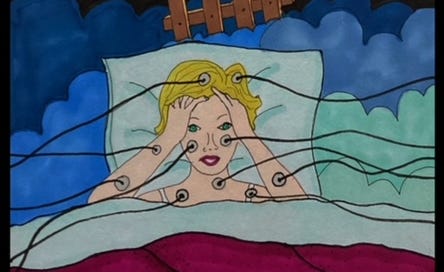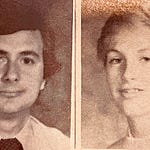Keep scrolling if you prefer to read and enjoy an original illustration by Canmore artist, Caroline Marion. Note: the text below states that I do not snore loudly. After vehement disagreement with that statement by Canmore artist, Caroline Marion, who once shared a back country ranger’s cabin with me after a day of hiking, and my son, Julian, who has suffered many sleepless nights while on vacation and sharing a hotel room with me, I have edited the recorded version to omit the part where I say I do not snore loudly. The truth hurts, but it will also set you free.
I am a Christian woman who makes every attempt to follow God’s commandments. I do not kill. I do not covet my neighbour’s house. I do not steal. Truth be told, there is not a lot to covet of my neighbour’s place. He also owns a 1960’s bungalow with drafty windows and a leaky basement. And in the spirit of confession, I should admit that in grade nine and on a dare, I stole a handful of black rubber Madonna-inspired bracelets from my local convenience store and, in a moment of mischief that could only be concocted by a group of bored and broke teenagers wandering around a department store, the hands off a ladies’ wear mannequin. All that aside, I am today a mostly mature woman with a desire to imitate Christ, repent when I do not, and love my fellow man as God loves me.
Until I do not sleep.
Like the other night at 2 am, when I found myself hovering over my boyfriend, Brock, a chronic snorer, who I had earlier banished to the basement bedroom. Now I stood by his bed, eyeing a pillow, and wondering just how bad eternal condemnation could be. Blissfully asleep, Brock was oblivious to the congested-walrus snorts he was catapulting at the floorboards and drywall to echo around the house. I had three options. Smother the man and go back to sleep. Wake the man, go back to sleep, and let him lay awake for the rest of the night. Or, as 1 Corinthians 13 teaches me to do, show the man charity by being patient and kind, and letting him sleep.
“Can’t do it, 1 Corinthians,” I thought desperately, forgetting the serenity prayer, the surrender prayer, and perhaps most needed in that moment, the litany of humility. Too sleepy for smothering, I chose toddler-style option two, shaking Brock awake, hissing into his startled face, “Stop snoring!” and running back to my bed so I could fall asleep before he did.
However much I would like to at times, I cannot blame Brock for my sleeping woes. My trouble with sleep started long before I met him. And even if I wanted to delude myself into thinking it had not and pin the blame on him, all hope of that was dashed two months ago at breakfast.
“You stopped breathing last night,” Brock announced with concern. He glanced at his Apple watch, always on his wrist and visual evidence of the veracity of his next statement. “For eleven seconds.” He paused, looking at the watch. “Twice.”
Some historians speculate that Napoleon Bonaparte had sleep apnea. “Yellow, obese, bloated, with his head too far down on his shoulders,” wrote novelist Paul de Kock of Napoleon in 1811, describing a few physical characteristics that can lead to what doctors call stop breathing events during sleep. I am not a French Emperor, yellow, obese, or generally bloated. Whether my head sits too far down on my shoulders is a question for other people to answer. However, in some ways, I am like Napoleon. It was also observed that he would fall asleep anywhere, anytime, and frequently in front of witnesses.
“You can fall asleep anywhere,” Brock once commented. Our plane had reached its cruising altitude and I had just jolted awake at the fasten seatbelt sign turning off. I wiped drool from the corner of my mouth, groggy from the involuntary nap that for me always starts on the tarmac after the safety demonstration and finishes in the air with the seatbelt ding or, in moments of extreme somnolence, the clinking of the drinks cart. I once fell asleep during a particularly long business meeting. My colleague hovered a dry erase marker at the whiteboard and asked, “Is this really happening?” as she watched my eyes close and my head drop to my hands, already in position to be a temporary pillow on the boardroom table below.
At least I am not Franklin Roosevelt, another excessively sleepy human who, historian, Robert Hugh Farrell tells us, “…blacked out halfway through signing his name to a letter, leaving a long scrawl.” No mention of where his head sat on his shoulders, but this sounds like a severe case. And while I do not want to start a who-has-less-sleep-apnea competition, I can at least get through a signature, Mr. President.
A month after Brock’s alert about my stop breathing events, I was at a sleep clinic sitting in a straight back chair in pyjamas and woolly socks while a sleep study technician placed electrodes on my head, face, chest, back, arms, and legs.
“To see if you kick your feet at night,” the technician explained as he snapped wires to the electrodes on my shins. I suddenly had a vision of my unconscious body frantically kicking sheets while my brain blared a need-to-pee siren hoping to wake me before I asphyxiated. It seemed like something from a horror film. I had not been nervous but now I was, thankful I would be monitored and hoping my technician was not one of the one-in-three Canadians who also suffers from sleep apnea, making him prone to nodding off while patients gasp and choke their way to the other side.
The connection of fifty or so wires to my body complete, I awkwardly tucked myself under the stiff, cotton sheets and into a pose resembling that of a homicide victim. Once he had every wire connected to a machine next to the bed, the technician wrapped a plastic tube around my ears and pushed nasal prongs up my nose.
“Okay,” he said, heading for the door and the light switch. “Have a good sleep!” I raised my eyebrows in response, pinned to the bed with wires and afraid to move anything for fear of upsetting an electrode. “Remember,” he added, turning off the light, and finally making clear the emergency protocol for a patient in distress. “Bang on the wall if you need to get up.”
I lay for a moment feeling every bit like someone who has fallen and cannot get up. Then, as I am prone to do at the slightest indication that it might be possible and preferable to the circumstances that surround me when awake, I went the way of Franklin Roosevelt and passed out.
Contrary to widespread belief, or perhaps just my belief, snoring does not equal sleep apnea. It is said that Winston Churchill was a “famous snorer.” Despite this, the man lived to 90, not great proof that he suffered with a condition that, if left untreated, can shave more than a decade off your life. Theodore Roosevelt’s snores were described as so “thunderous” that while recuperating in hospital one time, every patient in the wing was kept awake and, President or no President, filed complaints against him. (Mess with sleep and you mess with something deep in people.) One might chalk that up to sleep apnea. Some have tried. But other historians point out that Teddy Roosevelt rarely fell asleep before bedtime and, in a luxurious indulgence I would dream about if I ever slept long enough, was known to read at night, able to get through more than one page and never letting a book fall onto his face because he passed out mid-sentence. I am no sleep researcher, but I have book bruises and that does not sound like sleep apnea to me.
It turns out I do not snore a lot or loudly, but I do stop breathing. Thirty-nine times an hour during shallow sleep and 70 times an hour during deep sleep. To put that into perspective, I went to Google and searched, “What happens 39 times an hour?” Google sent back two pages of websites about my and Napoleon’s severe obstructive sleep apnea. It appears no one does anything 39 times an hour, except blink. And, lucky souls, breathe.
Next step is a CPAP machine and mask which I will strap to my head so it can force pressurized humidified air into my nasal passages and allow oxygen to nourish my body through the night. I can only imagine how I will feel. The energy! The stamina! The patience and kindness! 1 Corinthians 13, here I come.
And so, in the spirit of truth, I must put the pillow away and declare Brock not guilty of keeping me awake. In fact, I will have him to thank when I at last enjoy a good night’s sleep. And I will thank him right before wrapping my head in rubbery plastic and stuffing my ears with foam earplugs. I will be Darth Vader, slumbering peacefully to the rhythm of my unobstructed breath. With Teddy Roosevelt beside me.















Share this post